
Green Finance
Scope & Guideline
Fostering collaboration for a sustainable financial landscape.
Introduction
Aims and Scopes
- Green Financial Instruments and Markets:
Explores the development and impact of green financial products such as green bonds, ESG investments, and sustainable banking practices, aiming to assess their effectiveness in promoting environmentally sustainable projects. - Corporate Sustainability and Governance:
Investigates how corporate governance structures and sustainability practices influence financial performance, emphasizing the integration of environmental, social, and governance (ESG) criteria in business strategy. - Innovation for Sustainability:
Focuses on the role of innovation—especially in technology and management practices—in enhancing sustainability outcomes within various sectors, including energy, manufacturing, and finance. - Policy and Regulatory Frameworks:
Analyzes the impact of governmental policies, regulations, and fiscal incentives on promoting green finance and sustainable investments, providing insights into best practices and lessons learned. - Impact Assessment and Measurement:
Examines methodologies for assessing the impact of green finance initiatives on both environmental and financial performance, utilizing various quantitative and qualitative research approaches.
Trending and Emerging
- Integration of Digital Technologies:
The impact of digital technologies on green innovation is increasingly explored, emphasizing how advancements such as AI and machine learning can enhance sustainability practices and outcomes. - Role of Gender and Diversity in Sustainability:
Research focusing on the influence of gender diversity and inclusion in driving sustainable business practices is emerging, highlighting the importance of diverse perspectives in achieving sustainability goals. - FinTech and Sustainable Banking:
The intersection of financial technology and sustainable banking is a growing area of interest, with studies examining how FinTech can facilitate green financing and enhance access to sustainable financial products. - Climate Risk Assessment and Management:
There is a rising focus on assessing climate risks within financial markets, particularly concerning how these risks affect investment strategies and corporate governance. - Global Policy and International Cooperation:
Themes exploring international cooperation on climate finance and the role of global policies in promoting green finance initiatives are becoming more prevalent, reflecting the need for collaborative solutions to global environmental challenges.
Declining or Waning
- Traditional Energy Finance:
Research focusing on financing fossil fuel projects and traditional energy sources has decreased, as the focus shifts towards renewable energy and sustainable alternatives. - General Corporate Social Responsibility (CSR):
While CSR remains important, studies specifically addressing CSR without the context of green finance or sustainability are less frequently published, indicating a trend towards integrating CSR with environmental and financial outcomes. - Static Economic Models:
The use of traditional static economic models in assessing environmental impact has waned in favor of more dynamic and integrated approaches that consider the complexities of green finance. - Localized Studies Without Broader Implications:
Research that focuses solely on localized or case-specific analyses without linking to broader global trends in green finance is declining, suggesting a move towards more universally applicable findings.
Similar Journals
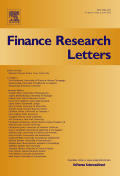
Finance Research Letters
Unveiling the latest trends in finance research.Finance Research Letters, published by Academic Press Inc Elsevier Science, is a leading journal in the field of finance, recognized for its exceptional impact as indicated by its Q1 ranking in the Finance category of the Scopus Index, placing it in the top 6% of journals in this area. With an ISSN of 1544-6123 and an E-ISSN of 1544-6131, this journal has been a crucial platform for disseminating cutting-edge research since its inception in 2004. It covers a wide array of topics within finance, including but not limited to portfolio management, risk assessment, and financial innovation, making it an invaluable resource for researchers, professionals, and students committed to advancing their understanding of the financial sector. Although it does not currently offer open access, its contributions to the field are amplified by its impressive Scopus rank of #19 out of 317 in the Economics, Econometrics and Finance category. As the journal continues through its convergence years until 2024, it remains dedicated to publishing high-quality, peer-reviewed articles that reflect the latest trends and innovations in financial research.
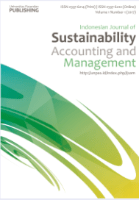
Indonesian Journal of Sustainability Accounting and Management
Transforming Knowledge into Action for SustainabilityThe Indonesian Journal of Sustainability Accounting and Management, with an ISSN of 2597-6214 and E-ISSN 2597-6222, is a premier open-access journal published by UNIV PASUNDAN dedicated to advancing knowledge in the field of sustainability accounting and management. Launched in 2017, this journal serves as a crucial platform for researchers, practitioners, and students, focusing on innovative practices, policies, and frameworks that promote sustainable business accountability and environmental management. Featuring rigorous peer-reviewed articles and case studies, the journal aims to foster interdisciplinary dialogue and contribute significantly to both local and global sustainability efforts. The journal is based in Bandung, Indonesia, and underscores its commitment to accessibility by offering all content openly available to readers worldwide, enhancing the dissemination of knowledge in this vital area of study.
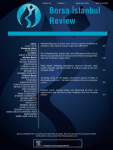
Borsa Istanbul Review
Fostering collaboration for a deeper economic insight.Borsa Istanbul Review, published by ELSEVIER, is a premier open-access journal making significant contributions to the field of Economics and Finance since its inception in 2013. With a commendable Q1 rating in both categories according to the 2023 metrics, this journal ranks impressively at #36 out of 317 in Finance and #91 out of 716 in Economics and Econometrics on Scopus, placing it in the top tier of international academic publications. The journal not only provides a platform for rigorous and innovative research but also aims to foster a deeper understanding of the evolving economic landscape, particularly within the frameworks of emerging markets. Catering to researchers, professionals, and students alike, Borsa Istanbul Review is dedicated to delivering high-quality, peer-reviewed scholarly articles that are freely accessible to enhance global research collaboration. It serves as an essential resource for anyone looking to stay abreast of cutting-edge developments in the financial and economic sectors.
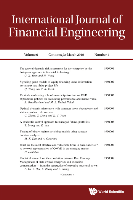
International Journal of Financial Engineering
Driving excellence in financial engineering research.The International Journal of Financial Engineering, published by WORLD SCIENTIFIC PUBL CO PTE LTD, is a premier academic journal dedicated to advancing the field of financial engineering. With a ISSN of 2424-7863 and an E-ISSN of 2424-7944, this journal offers a platform for groundbreaking research that intersects finance, mathematics, and computational techniques, promoting innovative solutions to complex financial problems. As a vital resource for researchers, practitioners, and students alike, the journal aims to disseminate cutting-edge methodologies and empirical studies that drive the financial industry forward. While the journal operates under a subscription model, its rigorous peer-review process ensures that only high-quality research is published, maintaining its significance within the academic community. With an ever-growing focus on quantitative finance and derivative pricing, the International Journal of Financial Engineering is essential for those seeking to enhance their understanding of financial markets and engineering.
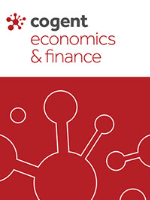
Cogent Economics & Finance
Advancing economic insights and financial strategies.Cogent Economics & Finance is a prominent open-access journal published by Taylor & Francis AS, catering to the dynamic fields of economics, econometrics, and finance. With an ISSN of 2332-2039, this journal aims to foster interdisciplinary dialogue and disseminate cutting-edge research from 2013 onwards. Hailing from the United Kingdom and featuring open access since its inception, it provides a platform for researchers, practitioners, and students to access high-quality scholarly articles without barriers. Currently categorized in the Q3 quartile for both Economics & Econometrics and Finance as of 2023, Cogent Economics & Finance remains vital for advancing knowledge in these areas, evidenced by its respectable Scopus rankings—310 out of 716 in Economics and Econometrics and 143 out of 317 in Finance. Its scope encompasses innovative research methodologies and policy implications, making it a significant resource for those on the cutting edge of economic and financial studies. Join us in exploring the critical aspects of this evolving field through our richly detailed articles, which support the academic community in addressing contemporary challenges and opportunities.
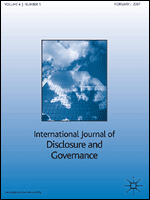
International Journal of Disclosure and Governance
Exploring the nexus of finance and accountability.The International Journal of Disclosure and Governance, published by Palgrave Macmillan Ltd, is a pivotal platform in the fields of Accounting, Business, Economics, Finance, and Management. With an ISSN of 1741-3591 and an E-ISSN of 1746-6539, this esteemed journal serves as a valuable resource for researchers, professionals, and students alike, looking to explore the intricacies of governance and transparency in financial practices and corporate strategies. As evidenced by its performance, the journal has achieved a commendable Q2 ranking across multiple categories in 2023, signifying its influential role within academic discourse, particularly in Economics and International Management. With a history that spans from 2009 to 2024, the journal provides insights that are essential for advancing knowledge and practice in a rapidly evolving global environment. While it operates under a subscription model, the work published here remains impactful, ensuring readers have access to high-quality research that can drive both theory and application forward.

Financial Internet Quarterly
Exploring the Future of Finance in the Digital AgeFinancial Internet Quarterly is an esteemed journal published by WALTER DE GRUYTER GMBH, specializing in the dynamic intersection of finance and digital technology. Since its inception in 2015 as an Open Access journal, it has aimed to disseminate pioneering research, innovative methodologies, and critical analyses pertaining to the financial internet landscape. By addressing contemporary issues in digital finance, cybersecurity, fintech solutions, and blockchain applications, the journal seeks to provide invaluable insights for researchers, policymakers, and practitioners alike. Located in Berlin, Germany, Financial Internet Quarterly fosters collaboration among scholars and industry leaders to advance knowledge in this rapidly evolving field, making it an essential resource for anyone interested in the future of finance.
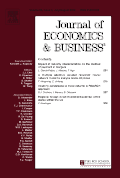
JOURNAL OF ECONOMICS AND BUSINESS
Uncovering Innovative Research in Business ManagementJOURNAL OF ECONOMICS AND BUSINESS, published by Elsevier Science Inc, stands as a leading platform for the dissemination of research in the fields of economics and business management. With an ISSN of 0148-6195, this journal is indexed in Scopus and boasts impressive rankings, including a position in the top 20% for both Finance and Economics and Econometrics. With a consistent publication history since 1978, it has become a vital resource for scholars and practitioners alike, providing insights into contemporary issues and emerging trends in the economic landscape. The journal, categorized in the Q2 quartile for both Business and Economics, invites rigorous research that advances theoretical and practical knowledge. While it operates under a subscription model, its notable impact factor reflects its significance and relevance in addressing critical questions within the business and economics domains. Whether you are a researcher, a business professional, or a student eager to deepen your understanding, the JOURNAL OF ECONOMICS AND BUSINESS is an essential resource for your academic and professional journey.

Public Finance Quarterly-Hungary
Advancing Insights in Public FinancePublic Finance Quarterly-Hungary is a premier academic journal published by Corvinus University of Budapest, dedicated to advancing the understanding of public finance and its intersection with broader economic and administrative frameworks. Operating under the ISSN 0031-496X and E-ISSN 2064-8278, this journal provides a vital platform for rigorous research and scholarly discourse in the fields of finance and public administration. With a notable impact factor reflected in its 2023 Scopus category rankings, which position it in the third quartile for both finance and public administration, the journal plays a critical role in shaping academic and policy debates in Hungary and beyond. The scope encompasses a wide range of topics related to public financial management, fiscal policy, and economic governance, appealing to researchers, practitioners, and students interested in both theoretical and empirical studies. As Hungary's key source of knowledge in public finance, Public Finance Quarterly underscores the significance of collaborative research efforts in addressing contemporary economic challenges.
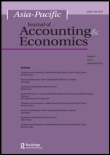
Asia-Pacific Journal of Accounting & Economics
Bridging theory and practice in Asia-Pacific accounting and economics.Asia-Pacific Journal of Accounting & Economics, published by Routledge Journals, Taylor & Francis Ltd, is a prestigious platform dedicated to advancing scholarly research in the fields of accounting, economics, and finance. Established in 2000 and converging its academic rigor through 2024, this journal serves as an essential resource for researchers, professionals, and students seeking to explore the interconnections and complexities within these disciplines. With a notable impact reflected in its Q3 rankings in Accounting, Economics, and Finance, the journal showcases the latest empirical research and theoretical advancements. Although it operates under a traditional access model, its commitment to quality and relevance in the Asia-Pacific region continues to make it a vital publication for those aiming to contribute to the understanding of economic dynamics and financial practices. Researchers and professionals are encouraged to engage with the articles herein to stay abreast of new insights and methodologies shaping the landscape of accounting and economics.